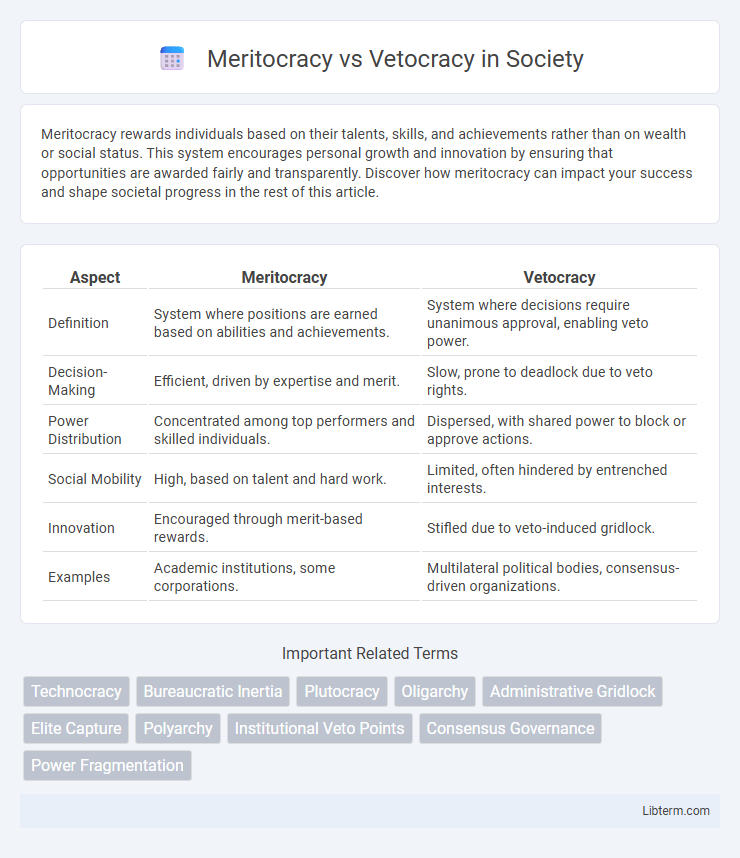Meritocracy rewards individuals based on their talents, skills, and achievements rather than on wealth or social status. This system encourages personal growth and innovation by ensuring that opportunities are awarded fairly and transparently. Discover how meritocracy can impact your success and shape societal progress in the rest of this article.
Table of Comparison
| Aspect | Meritocracy | Vetocracy |
|---|---|---|
| Definition | System where positions are earned based on abilities and achievements. | System where decisions require unanimous approval, enabling veto power. |
| Decision-Making | Efficient, driven by expertise and merit. | Slow, prone to deadlock due to veto rights. |
| Power Distribution | Concentrated among top performers and skilled individuals. | Dispersed, with shared power to block or approve actions. |
| Social Mobility | High, based on talent and hard work. | Limited, often hindered by entrenched interests. |
| Innovation | Encouraged through merit-based rewards. | Stifled due to veto-induced gridlock. |
| Examples | Academic institutions, some corporations. | Multilateral political bodies, consensus-driven organizations. |
Understanding Meritocracy: Definition and Principles
Meritocracy is a system where individuals are rewarded and advance based on their talents, skills, and achievements rather than on wealth or social status, emphasizing performance and competence as key criteria. Core principles of meritocracy include fairness in opportunity, recognition of individual merit, and the promotion of efficiency and innovation within organizations or societies. This system aims to create an environment where the most capable individuals lead and contribute to collective success, reducing nepotism and favoritism.
Unpacking Vetocracy: Origins and Key Features
Vetocracy derives from the Latin word "veto," signifying the power to reject decisions, and represents a governance system where numerous veto points create gridlock. It often emerges in pluralistic societies or organizations with multiple stakeholders, each possessing the ability to block proposals, resulting in decision-making paralysis. Key features include fragmented authority, overlapping jurisdictions, and institutionalized checks that hinder swift policy implementation and organizational agility.
Historical Evolution: Meritocratic and Vetocratic Systems
Meritocratic systems emerged prominently during the Enlightenment, emphasizing individual achievement, skills, and education as criteria for leadership and resource allocation, shaping modern bureaucracies and educational institutions worldwide. Vetocratic systems, characterized by multiple veto points and fragmented power, often developed in pluralistic democracies to prevent authoritarianism by dispersing authority among competing factions or institutions. Historically, shifts between meritocracy and vetocracy reflect societies' struggles to balance efficiency, accountability, and inclusion in governance structures.
Core Values: How Meritocracy and Vetocracy Differ
Meritocracy values individual achievement, promoting decisions based on talent, skills, and performance to drive efficiency and innovation. Vetocracy emphasizes collective approval, where progress depends on multiple stakeholders' consent, often leading to decision gridlock and slowed implementation. This core difference shapes organizational culture, with meritocracy encouraging competition and vetocracy fostering consensus at the cost of agility.
Decision-Making Processes in Both Systems
Meritocracy prioritizes decision-making based on expertise, skills, and demonstrated performance, ensuring that qualified individuals lead organizational or governmental processes. In contrast, vetocracy results in decision-making gridlock as multiple stakeholders possess veto power, often leading to stalemates and slowed progress. The efficiency of meritocratic systems contrasts with the paralysis frequently observed in vetocratic environments.
Impacts on Innovation and Progress
Meritocracy drives innovation and progress by rewarding talent, skills, and performance, fostering a competitive environment where the best ideas flourish and receive the necessary support. Vetocracy, characterized by excessive layers of approval and veto power, impedes decision-making and stifles creativity, causing delays in implementing innovative solutions and stagnating growth. The tension between merit-based advancement and bureaucratic obstruction significantly influences organizational agility and the pace of technological and social advancements.
Representation and Fairness: Who Benefits?
Meritocracy prioritizes representation based on individual skills and achievements, benefiting high performers by promoting fairness through objective criteria. Vetocracy allows multiple stakeholders to veto decisions, often resulting in power imbalances that favor entrenched interests rather than equitable representation. The struggle between these systems highlights how merit-based fairness can clash with inclusive representation, influencing who truly gains influence in organizational or political contexts.
Challenges and Criticisms of Meritocracy
Meritocracy faces criticism for perpetuating inequality by favoring individuals with access to education and resources, often neglecting systemic barriers faced by marginalized groups. The emphasis on individual achievement can foster unhealthy competition, overlooking collaboration and diverse talents. Critics argue meritocracy may reinforce existing social hierarchies rather than promote genuine fairness or equal opportunity.
Drawbacks and Dilemmas of Vetocracy
Vetocracy creates paralysis by enabling multiple stakeholders to exercise veto power, often resulting in gridlock and stalled decision-making processes. This system fosters conflicts and power struggles, undermining organizational efficiency and slowing down innovation. The dilemma lies in balancing inclusive input with effective governance, as excessive veto rights can erode accountability and strategic progress.
The Future: Balancing Meritocracy and Vetocracy
The future of governance demands a careful balance between meritocracy, which fosters innovation and efficiency by rewarding expertise and skill, and vetocracy, which emphasizes checks and balances to prevent abuses of power. Integrating meritocratic principles with robust veto powers can ensure that decisions are both competent and accountable, avoiding the pitfalls of unchecked authority and decision paralysis. Advances in technology and data-driven management may facilitate more transparent evaluation systems, enhancing this equilibrium for sustainable governance.
Meritocracy Infographic

 libterm.com
libterm.com